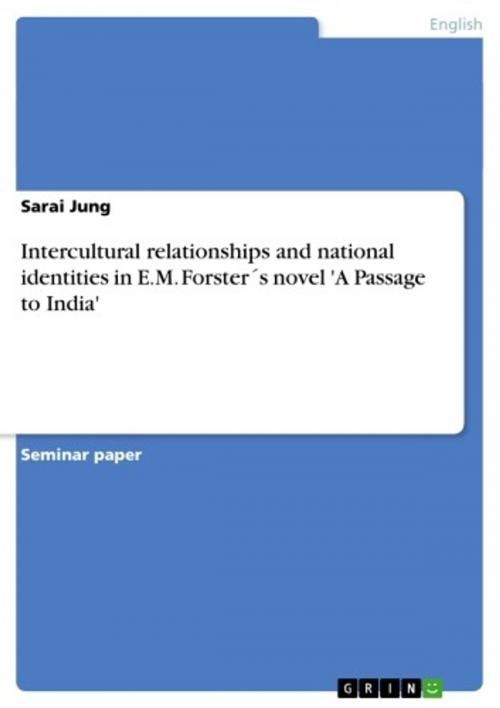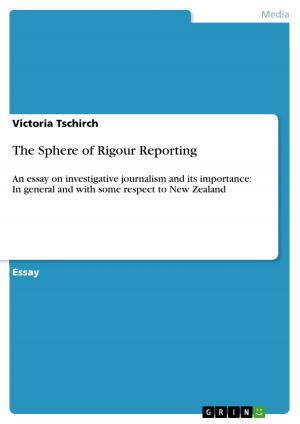Intercultural relationships and national identities in E.M. Forster´s novel 'A Passage to India'
Fiction & Literature, Literary Theory & Criticism, British| Author: | Sarai Jung | ISBN: | 9783638209243 |
| Publisher: | GRIN Publishing | Publication: | July 28, 2003 |
| Imprint: | GRIN Publishing | Language: | English |
| Author: | Sarai Jung |
| ISBN: | 9783638209243 |
| Publisher: | GRIN Publishing |
| Publication: | July 28, 2003 |
| Imprint: | GRIN Publishing |
| Language: | English |
Seminar paper from the year 2003 in the subject English Language and Literature Studies - Literature, grade: 2+ (B), University of Würzburg (Philosophy Institut II - Anglistics), course: Writing the British Empire, 10 entries in the bibliography, language: English, abstract: E.M. Forster´s novel 'A passage to India' was published in 1924. The work is largely based on the personal experiences Forster made during his two visits to India, which are the source of the striking authenticity of the text. Forster experienced the possibility of another view of life, that was opened up to him through his Indian friendships. On the other hand, he got to know the difficulties that spring up from so profoundly different approaches to life as the ones of the West and the East. Due to his own attitude of liberal-humanism and his belief in the freedom of action and the individuality of each human being as the basis for any political action, he was upset by the racial oppression, the cultural misunderstandings and the hypocrisies he found in Anglo-India. Forster´s novel is clearly concerned with the doubtfulness of the concept of superiority. It puts forth the question to what extent a culture can claim to be a civilized nation and in virtue of what it can be justified to impose one´s own way of life upon another culture. The author provides us with a vivid picture of Indian concepts and Indian sets of values without judging them or separating right from wrong. His suggestion seems to be to accept the co-existence of such alternatives. More complex is the problem of intercultural relationships. How can barriers be torn down and bridges be built? To this question, Forster does not give a definite answer. He suggests a flourishing interchange between the races until the necessary cultural sensibility is achieved. At several points in the novel, the author hints at the general possibility of a peaceful relation between the two races: All the Indians who had been in England had had only positive experiences. But within a colonial context this seems impossible. Although reconciled, Aziz and Fielding have to accept that their friendship is not possible because they have no meeting place, at least 'not yet', not until India has her own nation and is free from the oppression of the colonial system.
Seminar paper from the year 2003 in the subject English Language and Literature Studies - Literature, grade: 2+ (B), University of Würzburg (Philosophy Institut II - Anglistics), course: Writing the British Empire, 10 entries in the bibliography, language: English, abstract: E.M. Forster´s novel 'A passage to India' was published in 1924. The work is largely based on the personal experiences Forster made during his two visits to India, which are the source of the striking authenticity of the text. Forster experienced the possibility of another view of life, that was opened up to him through his Indian friendships. On the other hand, he got to know the difficulties that spring up from so profoundly different approaches to life as the ones of the West and the East. Due to his own attitude of liberal-humanism and his belief in the freedom of action and the individuality of each human being as the basis for any political action, he was upset by the racial oppression, the cultural misunderstandings and the hypocrisies he found in Anglo-India. Forster´s novel is clearly concerned with the doubtfulness of the concept of superiority. It puts forth the question to what extent a culture can claim to be a civilized nation and in virtue of what it can be justified to impose one´s own way of life upon another culture. The author provides us with a vivid picture of Indian concepts and Indian sets of values without judging them or separating right from wrong. His suggestion seems to be to accept the co-existence of such alternatives. More complex is the problem of intercultural relationships. How can barriers be torn down and bridges be built? To this question, Forster does not give a definite answer. He suggests a flourishing interchange between the races until the necessary cultural sensibility is achieved. At several points in the novel, the author hints at the general possibility of a peaceful relation between the two races: All the Indians who had been in England had had only positive experiences. But within a colonial context this seems impossible. Although reconciled, Aziz and Fielding have to accept that their friendship is not possible because they have no meeting place, at least 'not yet', not until India has her own nation and is free from the oppression of the colonial system.















